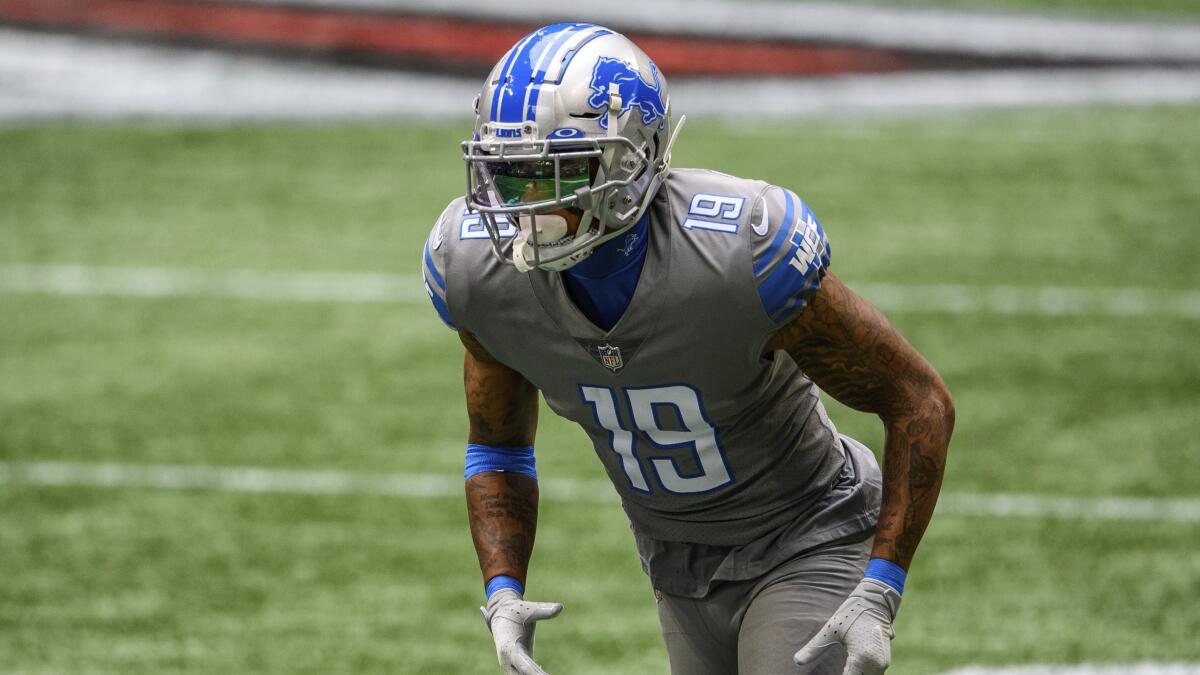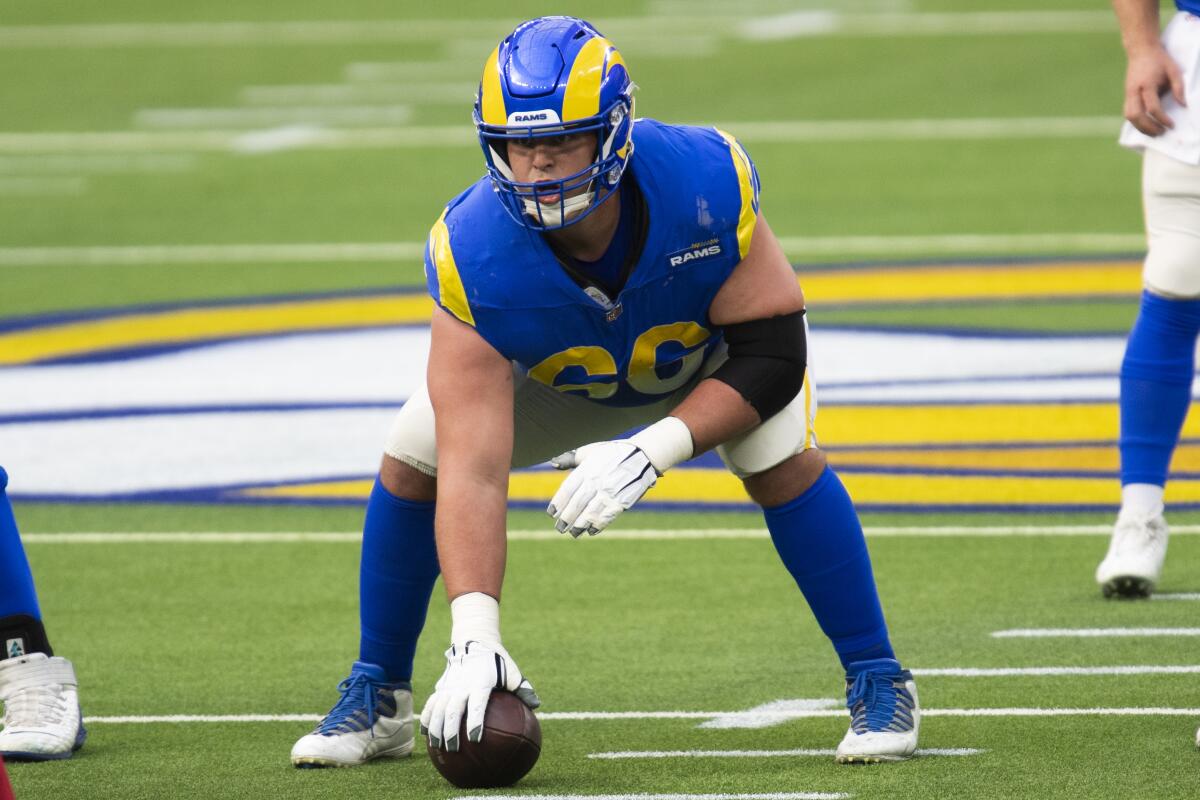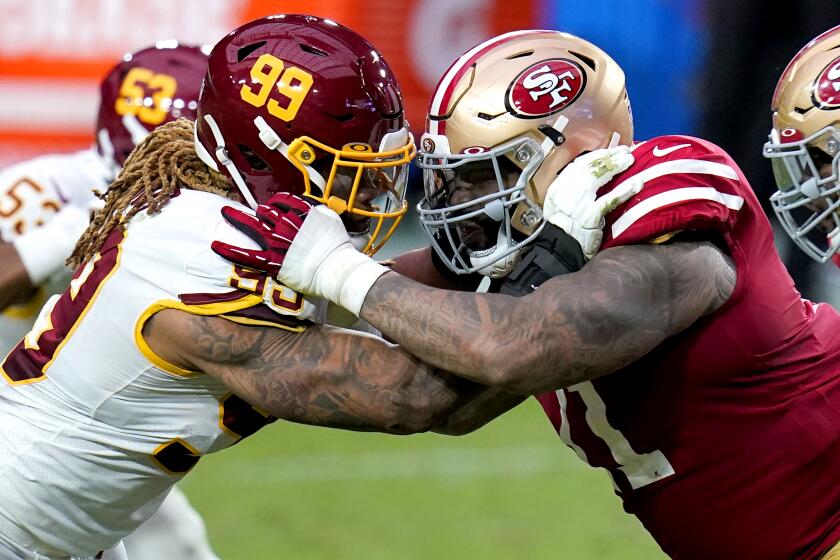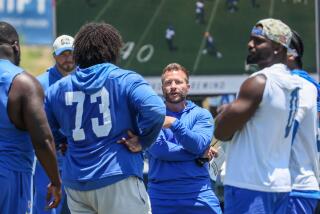Rams’ salary-cap challenges could have big effect on free agency plans

For the second year in a row, the Rams are preparing for a free-agent exodus of key players on defense — and strategizing about how they might be replaced.
On Monday, when the NFL’s so-called legal tampering period begins 48 hours before the start of free agency, representatives for safety John Johnson, edge rusher Leonard Floyd and cornerback Troy Hill will be fielding offers from suitors positioned to outbid the Rams.
Defensive linemen Morgan Fox and Derek Rivers, linebacker Samson Ebukam, running back Malcolm Brown, tight end Gerald Everett, receiver Josh Reynolds, offensive lineman Austin Blythe and long snapper Jake McQuaide also are pending unrestricted free agents.
Last season, in the days leading up to the NFL’s new league year, Rams defensive tackle Michael Brockers and linebackers Dante Fowler and Cory Littleton agreed to contracts with other teams. Brockers returned to the Rams after his deal with the Baltimore Ravens collapsed. But last year’s departures might have portended a trend for a defense that in 2020 ranked among the NFL’s best under coordinator Brandon Staley, now coach of the Chargers.
With the COVID-19 pandemic cutting into NFL revenue, the salary cap took a big hit this year. Here’s how it will affect NFL free agency this week.
Last Wednesday, when the NFL set the salary cap at $182.5 million, the Rams were $33.1 million over the limit — the most of any team — according to overthecap.com.
The Rams’ problematic situation was created, in part, by dead money hits for the release of running back Todd Gurley before last season and the January trade of quarterback Jared Goff for quarterback Matthew Stafford. The NFL, unlike the NBA and Major League Baseball, does not provide a mechanism to exceed the salary cap by allowing teams to pay a luxury tax. All NFL teams must be under the cap by Wednesday at 1 p.m. PDT.
The Rams will try to get under the cap by restructuring contracts of such top-earning players as defensive lineman Aaron Donald, cornerback Jalen Ramsey and receivers Cooper Kupp and Robert Woods. General manager Les Snead and vice president Tony Pastoors also have almost certainly been in restructure discussions with such players as Brockers and offensive linemen Andrew Whitworth and Rob Havenstein, who might otherwise be candidates for release in a year when the cap fell nearly $16 million from 2020 because of revenue losses caused by the COVID-19 pandemic.
“It’s evolving. It’s changing. It’s unprecedented,” Snead said of operating in a year when the cap decreased. “This is tougher. So, I think all of us have been willing to somewhat make sacrifices, somewhat think out of the box, that wouldn’t necessarily normally occur in a normal year.”

High-salaried veteran players across the league are similarly vulnerable to release, so this year’s free-agent class is expected to expand daily as teams shed contracts to get under the cap.
The Rams are not expected to be major players in the first wave of free agency, which could be marked by an increase in one-year contracts as players and teams hedge their bets that the cap will increase in 2022 and beyond.
Along with perusing available talent on defense, the Rams could shop for a receiver.
Stafford displayed proven ability to complete longer passes during 12 seasons with the Detroit Lions. While Kupp and Woods are productive mid-range receivers, coach Sean McVay acknowledged after the season that the Rams lacked a legitimate deep threat. The offense produced few of the long plays — “explosives,” as McVay describes them — that characterized the offense in 2017 and 2018.
“When you have to go 12, 15-play drives consistently, your margin for error is so small,” McVay said. “The level of competition is just so great that you have to be able to find ways to continuously create explosives, give yourself a little bit of margin for error, that it’s not always taking that many plays to produce points in this league.”
Rams GM Les Snead hopes to contend with how far over the salary cap the team is by restructuring contracts of veteran players so cuts don’t have to happen.
Kenny Golladay and Marvin Jones, who played with Stafford in Detroit last season, are among receivers in a free-agent class that includes former USC star JuJu Smith-Schuster, former Ram Sammy Watkins, T.Y. Hilton, A.J. Green, Will Fuller and DeSean Jackson among others. But the Rams are not expected to spend big at the position.
Blythe, who was a pending unrestricted free agent in 2020, signed a one-year contract before last season and subsequently solidified his opportunity for a long-term deal with solid play. If Blythe moves on, the Rams might turn to fourth-year pro Brian Allen, who was sidelined nearly all last season because of a 2019 knee injury. Or the Rams could sign a free agent or draft a center.
But every scenario has unknowns, Snead said.
“The key that what we don’t necessarily know with Brian is … how will he play post-injury?” Snead said, adding, “Because it’s such a nuanced position of almost being the second QB on the field, it’s hard just to project a rookie can do it.
“It’s even hard just to project a player that may be with another NFL team can do it just because they will still have to learn our system and still at that point have to quickly process football within our system.”
Get our high school sports newsletter
Prep Rally is devoted to the SoCal high school sports experience, bringing you scores, stories and a behind-the-scenes look at what makes prep sports so popular.
You may occasionally receive promotional content from the Los Angeles Times.
More to Read
Go beyond the scoreboard
Get the latest on L.A.'s teams in the daily Sports Report newsletter.
You may occasionally receive promotional content from the Los Angeles Times.









